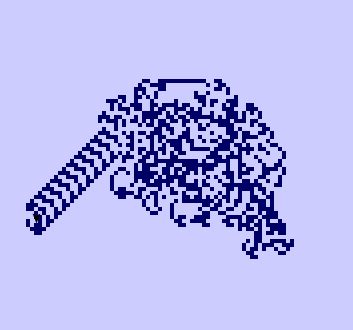Remote Ready Biology Learning Activities has 50 remote-ready activities, which work for either your classroom or remote teaching.
Serendip is an independent site partnering with faculty at multiple colleges and universities around the world. Happy exploring!

| 
| Exploring Emergence |
 |
 |

|
So, Langton's ant does some pretty sophisticated things but ... there isn't actually much there to do them. It looks like you don't have to have long or complex sets of instructions to get quite sophisticated behavior. Are there other sophisticated things that might have relatively simple explanations? That's worth spending some time on, but let's also think a little more specifically about this particular case and what we can learn from it.
A useful general way to think about the world of Langton's ant (and perhaps other things as well?) is that it consists of
We've already noticed that the world of Langton's ant is "deterministic", that is if we start over from exactly the same starting condition exactly the same thing happens. And that makes some sense, since not only do we know everything there is to know about both the agent and the environment but we also know that the agent has a fixed set of rules that govern its behavior. Those rules never change. BUT .... the ant's behavior seems to change. How can we account for the observation that the ant seems to intially wander aimlessly and then, suddenly, seems to start building a road? Remember, NOTHING changes inside the ant.
What this is telling us is that an agent's behavior is not fully determined by what is inside it, that it depends as well on what is in the environment around it. And since the instructions in the agent don't change, it must be changes in the environment that produce the changes in behavior that we observe. That's actually not such a extraordinary idea, that the environment influences behavior. But its worth keeping in mind when, for example, people talk about genes determining behavior. Genes are an example of something inside an agent (including ourselves) that influences but does not determine behavior.
What's perhaps a little more unusual is the idea that the environment that influences an agent's behavior can itself be influenced by the agent. We tend to think of the environment as what influences an agent but in this case the influence is bidirectional: the ant can alter its environment which in turn can alter the behavior of the ant. In fact, when the ant starts building roads in an empty environment it does so because the ant itself has created in the environment a pattern of light and dark squares that the ant responds to by building a road. Can you tell what that pattern is? Test your guesses by changing the colors of squares around the ant to see if you can cause it to build a road without an initial period of wandering around (don't give up exploring, there's lots to learn from it, but if you get tired we'll show you the answer on the next page).
What you're doing now, of course, is yourself altering the world of Langton's ant. So we need to recognize that in addition to agents and environments and their interactions what is going on here involves also ... ? Let's have a look at and think about that thing (those things?) as well.
| "The World of Langton's Ant" was produced by Paul Grobstein with the Summer 2005 Serendip/SciSoc group. Applets were created with NetLogo by Rebekah Baglini, building on earlier work. Our thanks to the Emergent Systems Working Group for fertile conversations from which this emerged and to which we hope it further contributes. |
Watching Looking Inside Agents/Environments | Observers | Architects | Beyond Determinism? Summary and ... Further reflections on Emergence and Science Education |